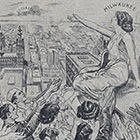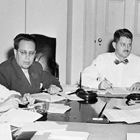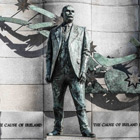
What Milwaukee Can Teach the Democrats about Socialism
The Democratic Party didn’t choose Milwaukee for its 2020 convention because of its radical past. But the city’s history shows how socialism worked in the United States—and could work again.


The Democratic Party didn’t choose Milwaukee for its 2020 convention because of its radical past. But the city’s history shows how socialism worked in the United States—and could work again.

Before Eugene Debs became the most popular socialist in American history, he was an innovative and courageous labor leader. As leader of the American Railway Union (ARU), founded in 1893, he attempted to gather all the crafts in what was …

Since August 2018, one of the most important political processes of the last few decades has been taking place in Cuba: a public debate over a proposed constitution.

Wright will be remembered as an iconic thinker who embodied the socialist vision that he worked so hard to bring forth.

“Capitalism is dying,” wrote Michael Harrington forty years ago. “It will not, however, disappear on a given day, or in a given month or even year. Its demise will take place as a historic process that could lead to democratic socialism—or to a new kind of collectivist and authoritarian society.”

If there’s one thing worth taking away from the White House report on socialism, it’s that economics is a political argument, not just a technical exercise.

As liberal comedy flounders, Chapo Trap House issues a welcome corrective—a brand of humor that is not just combative, but offers a systemic explanation for capitalism’s ills.

How do socialist demands become liberal common sense? The history of the New Deal offers a useful lesson.

James Connolly’s legacy is often wrongly shrunk down to that of a martyr for Irish freedom. A new collection of his writing aims to correct this record and reclaim him for the left.

The millennial embrace of socialism has allowed a new generation to draw inspiration from a long legacy of struggle.
“Suffering justifies our hard and bitter life,” writes Svetlana Alexievich of Soviet life. “For us, pain is an art.”

The Democratic primary revealed the fault lines of both establishment feminism and the socialist left. It also suggested an appetite for the kind of feminism we need—one that understands the impact of economic and foreign policy on the majority of women’s lives.

As Latin America’s “pink tide” appears to ebb, Patrick Iber, Javier Buenrostro, Sujatha Fernandes, Bryan McCann, and Thea Riofrancos examine its lessons for democratic socialists in the region and abroad.

Targeted use of revenue from commodities can be an immediate and necessary salve against brutal levels of poverty and inequality, but Chavismo’s “extractivist” model has left Venezuela as vulnerable as ever to the whims of the international market.

The central protagonists of Latin America’s profound shift away from the neoliberal policies of the 1980s and ‘90s were not strong leaders but social movements.